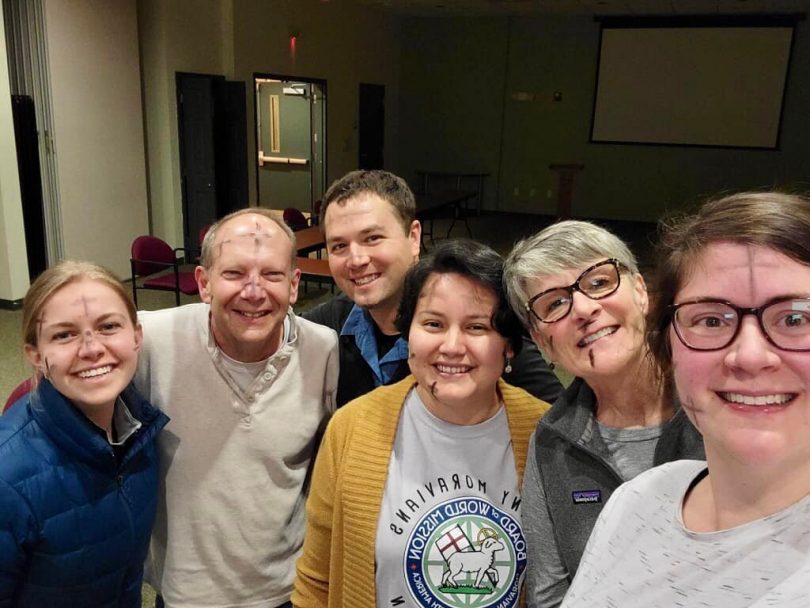Christ The Chief Elder Sunday
Preaching Text: John 10:1-10. However, this text is just a springboard to tell the story of the experience of September 13, 1741, which was then shared with the wider Moravian church on November 13, 1741. I pulled together this historical account several years ago, but unfortunately, I did not make a note of its source. So, I will fully acknowledge that much of this is sourced from some Moravian historian or two, but I don’t know who they are. I am eternally grateful to whomever it was.
The Gospel of John gives us several images in which we can gain a deeper sense of who Jesus is for us and for the world:
- Jesus is a spring of living water from which the thirsty can draw (John 4:14).
- He is the grape vine in which we are to remain connected (John 15:1-4).
- He is bread for the hungry (John 6:5-11, John 6:30-35).
- He is the lamb of God who takes away the sin of the world (John 1:29).
- He is the good shepherd who lays down his life for the sheep to give them life and keep them safe (John 10:10-11).
- He brings his own into his father’s household (John 14:2-3). And the path by which we can go to the Father (John 14:4-6).
- He is the light of the world (John 8:12), and he gives sight to the blind (John 9:1-7).
- He is the gate by which the sheep enter the sheepfold (John 10:7).
Here Jesus is the door through which we enter for protection, sanctuary, fellowship.
But Jesus is also the door through which we exit back into the world, but then the writer switches the imagery, and Jesus becomes not just the gate but the shepherd that leads us to pasture, still waters, and abundant life. This is a dynamic image as we think about our Moravian history of intense religious experiences that were followed by seasons of remarkable evangelism all over the world. The September 16, 1741 experience is the one that named Jesus as the Chief Elder of the Moravian Church. This was announced to all congregations on November 13 of that same year. So, on the Sunday closest to November 13, we Moravians always take time to remember this story.
This is what our church historians have related to us:
On September 16, 1741, the leaders of the Moravian Church were meeting in London to make a number of important decisions. One of them was to choose a new Chief Elder. Leonard Dober, the first of the missionaries to the enslaved persons in the Caribbean, had served as the Chief Elder for several years. It was a big job. He was responsible for the spiritual welfare of a church that had grown rapidly from a little community in Herrnhut, Germany, to an international fellowship stretching from Greenland to South Africa.
The Chief Elder was primarily responsible for hearing people’s complaints and concerns, especially in spiritual matters. He prayed on behalf of the community, and at times he worked to make peace between individuals. He was a pastor who was expected to offer sound advice. There was also a Chief Eldress for the women of the church. It was Anna Nitschmann, the head of the Single Sisters Choir, for many years.
Leonard Dober was tired. The job was wearing him out, and people complained about how he did things. So, he officially asked to step down from the office. The rest of the elders then set about trying to find someone to replace him. The elders gathered included Count Nicholas and Erdmute von Zinzendorf, Benigna, their daughter (who was only 16), Leonard Dober, Anna Maria Lawatsch, Friedrich von Watteville (Zinzendorf’s best friend), Rosina Nitschmann, David Nitschmann, and August and Mary Spangenberg. This impressive group included some of the wisest people in the church.
It is impressive that there were as many women as men at the meeting. That would not have been the case for other churches at that time. It is also remarkable that most of the participants were under the age of 42. By our standards, these elders were relatively young. They were also creative and adventurous. Each of them had traveled through many countries and across the ocean to spread the good news that God loves all people, especially those who have been rejected by the world.
In those days, Moravians made essential decisions by selecting a lot, a process no longer used in the modern church. They believed that using the lot allowed Jesus to have a direct voice in the decisions of the church. The elders would discuss a problem and propose a solution. Then they would pray for divine guidance, and finally, they would pull out a slip of paper from a box. If it said “yes,” they would go ahead with the decision. If it said “no,” they tried to find another solution. Sometimes the lot said, “wait,” so they would give the situation a little more time and try again.
On September 16, by using the lot, they asked the Lord if Leonard Dober could stop being Chief Elder, and the answer was “yes.” After that, they submitted many names of people they thought could replace him, and the lot rejected each person. They grew worried and took time to pray and read the Bible. The verses they read all talked about Jesus’ role as the great shepherd and Lord of the church. Finally, the small group of elders decided to ask this question: “Whether this signified that the Savior would himself undertake the office.” To their surprise, the lot agreed, and in good Moravian fashion, they sang a hymn, “We kiss thee with great tenderness, you elder of the congregation.” So on that day, we Moravians began to look to Jesus as the Chief Elder of our Church and of our lives.
This was such an extraordinary event that the elders decided not to announce it immediately to all the congregations. They took a couple of months to prepare liturgies and sermons to celebrate what had happened. The day they chose to make Jesus’ election publicly known was November 13, and we still celebrate that date in many congregations with the serving of Holy Communion. At the time, November 13 signified that Christ was pleased with the work of the church and would continue to bless it as the Chief Elder.
We no longer use the lot as a way to figure out what Jesus would have us do in the church, but we still look to him as our Chief Elder. He is the one we should take our troubles to, and he is the one who can overcome divisions and anger. He is the one who teaches us to forgive and who sends us out in the world as servants. By proclaiming that Jesus is our Chief Elder, we acknowledge that he is the true head of the church, and all that we do should be pleasing to him. It also reminds us that authentic leadership is servant leadership like that of Jesus. Every November 13, Moravians around the world should ask themselves, “what does our Chief Elder want us to do as a church?”
It also challenges us to consider who we are following once we exit the doors of this church and re-enter the world. Who is guiding our daily lives and decisions on how and where to spend our time and how and where to spend our money?
Jesus is the gate, the shepherd, and the chief elder. Let us follow him.







